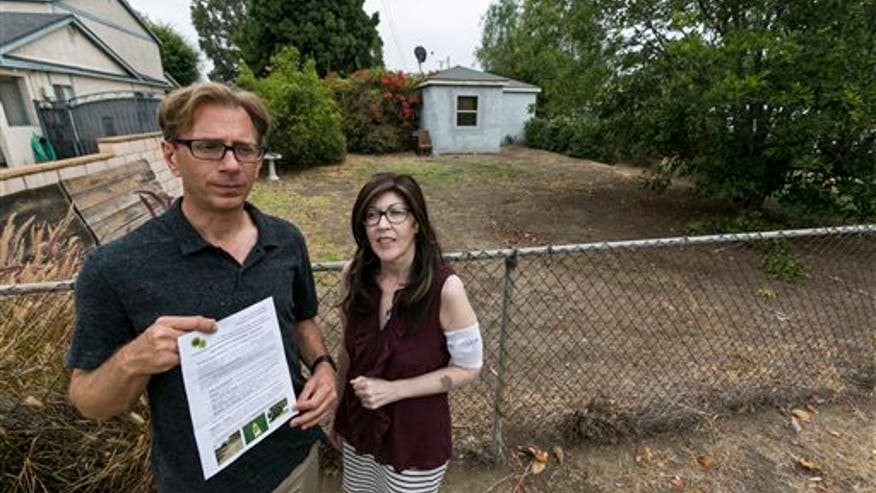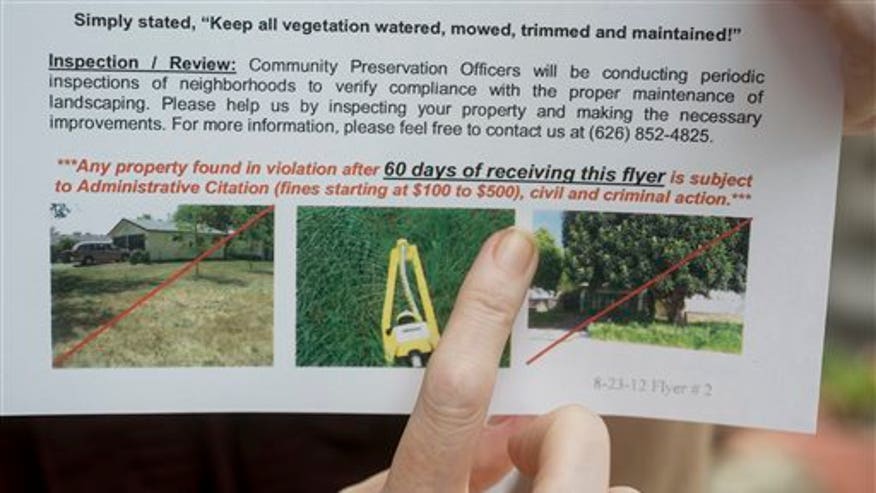California couple faces fine for brown lawn after complying with water-saving rules

California couple faces fine for brown lawn after complying with water-saving rules
LOS ANGELES Laura Whitney and her husband, Michael Korte, don't know whether they're being good citizens during a drought or scofflaws.
On the same day the state approved mandatory outdoor watering restrictions with the threat of $500 fines, the Southern California couple received a letter from their city threatening a $500 penalty for not watering their brown lawn.
It's brown because of their conservation, which, besides a twice-a-week lawn watering regimen, includes shorter showers and larger loads of laundry.
They're encouraged by the state's new drought-busting, public service slogan: Brown is the new green.
The city of Glendora sees it differently.
"Despite the water conservation efforts, we wish to remind you that limited watering is still required to keep landscaping looking healthy and green," says the letter, which gives Korte and Whitney 60 days to restore their lawn.
They're among residents caught in the middle of conflicting government messages as the need for conservation clashes with the need to preserve attractive neighborhoods.
"My friends in Los Angeles got these letters warning they could be fined if they water, and I got a letter warning that I could be fined for not watering," Whitney said. "I felt like I was in an alternate universe."
Despite the drought, Californians have increased their water use by 1 percent in May compared with previous years, according to a state survey of water providers. To combat perceived complacency, the state water board voted this week to require water agencies to adopt emergency drought plans and authorized fines of up to $500 a day for water wasters.
The board's chairwoman, Felicia Marcus, said "a brown lawn should be a badge of honor because it shows you care about your community." But several homeowners are reporting that a dried-up lawn instead attracts the wrath of their community.
Homeowners associations can't punish residents for scaling back on landscaping under an executive order signed by Gov. Jerry Brown in April and a bill awaiting his signature. While both measures are silent on fines imposed by local governments, the governor's office condemned moves that punish drought-conscious Californians.
"These efforts to conserve should not be undermined by the short-sighted actions of a few local jurisdictions, who chose to ignore the statewide crisis we face, the farmers and farmworkers losing their livelihoods, the communities facing drinking water shortages and the state's shrinking reservoirs," said Amy Norris, a spokeswoman for the California Environmental Protection Agency, in a written statement.
Local officials say conserving water and maintaining healthy landscaping are not mutually exclusive goals. They caution that even in times of water shortages, residents shouldn't have free rein to drive down property values, and they can use drought-resistant landscaping or turf removal programs to meet local standards.
"During a drought or non-drought, residents have the right to maintain their landscaping the way they want to, so long as it's aesthetically pleasing and it's not blighted," said Al Baker, president of the California Association of Code Enforcement Officers.
Anaheim resident Sandra Tran, 47, said she started installing drought-resistant landscaping after receiving violation notices from Orange County Public Works. She spent more than $600 on the changes as the agency mandated she water and maintain her yard in "a healthy green condition."
Yet as Tran drives home from work, she sees signs flashing on the freeway urging her to conserve water.
"It's almost crazy because one agency is telling you one thing and another is forcing you to do the opposite," she said.
Democratic Assemblywoman Cheryl Brown introduced a bill that would have prohibited local governments from imposing fines, but she dropped AB1636 after cities in her district promised not to penalize homeowners for brown lawns during a drought emergency.
Brown was shocked when she heard the practice continued elsewhere in the state, and said she would consider reviving her bill in 2015.
"It seems to me those cities aren't using common sense," Brown said. "It's too bad you need a law."






These poor people are between a rock and a hard place.....
Common sense in government...I doubt it.
or...concrete and paint it green..
This is EXACTLY why they have a water shortage in the first place. Xeroscape landscaping is the way to go!
California-- WAKE UP! You are using more water than you have! You are mining your resource, and when you mine it all, you will have NOTHING to use.
Sheesh!!!
lol...You tell them Dowser!!
I say xeroscape is the way to go...
I've got some water company shares for the company that services southern CA... writing is on the wall for that cash cow.
I think we're looking at global conflict over water in the next 50 years or so.
I do too!!!
Including the US!
lol...
LOL I hope they do too.
Smart move. My older brother lives in Texas and somehow he id able to have a gorgeous lawn.
And he does it all himself, no help.
I'm scratching my head over this one...
Kav, I doubt it too..
Alrighty then...
Can you say "One hand of government doesn't know what the other hand is doing," boys and girls?
Can you say "An Inconvenient Truth?"
Who owns pools? That would be why they are exempt.
I can certainly understand that...
I'm sure it's been done.
Loud and clear Mac!
ROFL...
And that my friends, is a "Good Thing."
Smart!
You're doing your part!
105 WOW I live in Northern Illinois, and have never ,and probably NEVER see 105 degree weather!
So it's a "win -win " arrangement for you. Good for you!! I'm glad someone is ahead of the game.
I have just three words to say: Green Spray Paint.
lol....Pretty much!!!
WOW..I couldn't handle that! But, people from the South have a hard time handling the Winters up here.
MM...I'm sure youhad worse Winters in Michiganthan we get here. I can see where it wouold be very nice to be able to sit at an outside cafe...
February is usually our rough month.